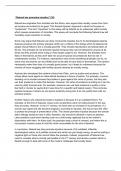"Natural law promotes injustice" (30)
Natural law originates from Aristotle and the Stoics, who argued that morality comes from God
as humans are inclined to do good. This formed Aquinas' argument in which he focuses on
"synderesis". The term "injustices" in this essay will be defined as an unfairness within society
which causes persecution of minorities. This essay will conclude that following Natural Law will
inevitably cause injustices in society.
Some may argue that Natural Law does not promote injustice due to its deontological aspects.
Aquinas proposes the primary precepts which are a criteria of five things which he believed all
people should follow to live a morally good life. They include reproduction and preservation of
life etc. The precepts do not promote injustice because they can be followed by anyone at all
times and they provide some ruling on how people ought to act. However, the precepts have
flaws in themselves as they don't take into account special circumstances that we see in
contemporary society. For instance, reproduction may not be something all people can do, as
some men and women can be infertile and not be able to have kids for themselves. This doesn't
necessarily make them less of a morally good person, but it leads to unfairness because the
minority of those struggling with fertility become deemed as morally wrong.
Aquinas also developed the cardinal virtues from Plato, such as justice and prudence. The
virtues allow moral agents to make ethical decisions in favour of justice. For example, a person
deciding not to murder because they believe it goes against the virtue of justice, but they also
use their prudence to make that decision. However, the virtue of prudence is limiting as it can be
used to justify immoral acts. For example, someone can use their prudence to justify a crime
like theft or murder by saying that it was done for a specific and logical reason. This promotes
injustice because it means we can ignore evidently wrong acts if we can justify them with our
practical wisdom.
Another reason why natural law leads to injustice is because it is an outdated theory. For
example, at the time of Aquinas, issues such as abortions were not really present in the way
they are today. However, in the 21" century, we have seen an increase in its prevalence. If a
woman was raped and she became pregnant, according to Aquinas, she has to have the child
to protect the precept of preservation of life. This clearly promotes injustice because the woman
didn't willingly decide to have a child, therefore, she should be allowed to have an abortion.
Later problems could even develop such as a child being neglected due to the mother's
dissociation with them. As Kainz said, the precepts imply a level of consent, and where this is
not present it seems unjust to hold the victim accountable for the sins of abortion.
In conclusion, Natural law does promote injustice because of its outdated, inflexible
deontological nature, as it justifies immoral acts which are just simply wrong, as well as putting a
negative light on those who cannot follow the precepts. Instead, proponents of Natural Law
need to consider what is morally permissible in the 21" century and devise a system which is
flexible enough to deal with some of the modern challenges that society faces.




